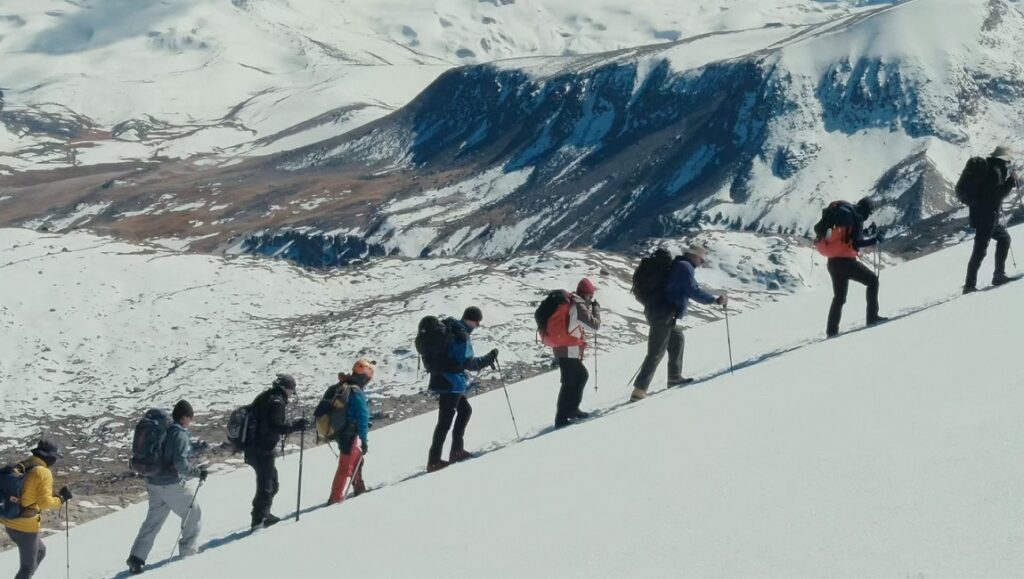As climate change continues its steady march toward apocalyptic crescendo, its devastating effects are becoming more and more visible. In 2022, the United States alone experienced 18 climate disasters that cost more than one billion dollars; this includes heat waves and forest fires, as well as winter storms and other severe weather events. Also topping out at over a billion in number are the estimates for how many climate refugees there will be by 2050. With conservatives continuing to deny the phenomenon so that corporate greed can more easily take precedence over human lives, even the most optimistic out there are starting to lose hope. Lonnie Thompson, a research scientist at the Byrd Polar Research Center at The Ohio State University, is one of these dreamers. He’s also the subject of Danny O’Malley and Alex Rivest’s new documentary, Canary, which uses Thompson’s work studying glaciers as an entry point into a deeper examination of the particularly human reaction to climate change.
“Canary in a coal mine. Our early warning system for the planet. And they’re telling us there’s serious danger here,” says Thompson of glaciers, which he has researched for more than 40 years. Growing up in Gassaway, West Virginia, where “you went to a university, or you went to the coal mine,” Thompson chose the education route and subsequently traveled around the world taking core samples of glaciers to learn more about the earth’s changing global ecosystem. He even earned the National Medal of Science from George W. Bush in 2007, an honor he expresses conflicted feelings about given Bush’s climate policies. Canary chronicles Thompson’s life and research, from an upbeat scientist hoping his work will make a difference to a somewhat jaded expert who believes he has let humanity down by failing to solve this most existential of crises. “We really haven’t changed the direction we are headed. And in fact, I would argue that we have even gone backwards,” Thompson states at one point.
This attitude forwards one of Canary’s most refreshing elements: it doesn’t sugarcoat the realities of our increasingly dire circumstance in empty optimism, and its centering of Thompson puts an expert face on this growing cynicism from the scientific community, notable amidst the deafening cultural roar of armchair scientists (and, of course, science deniers). Thompson also happens to be a lovable subject, a man who has spent his life fighting a problem with passion and dedication, and is unguarded about his mounting disillusionment. But there are other experts here as well: Canary platforms other deeply knowledgeable voices, all commenting on both Thompson’s specific work and the climate crisis broadly. Madeleine Nash, a science writer, notes, “The worry I have is that we finally decide to do something, and it just becomes so much more difficult, because we are kind of not in control anymore.” This register of bleakness permeates the film, consistently reminding viewers of the large swath of policy-makers and power-holders who deny all belief in the problem. But Canary isn’t entirely fatalistic, and ends with Thompson’s observation that “things are only impossible until they become possible.”
Unfortunately, Thompson’s appealing presence and the film’s discursive frankness can only carry Canary so far, and it struggles in most other arenas. Chiefly, it fails as a visual text; outside of the expected talking heads and present-day depictions of Thompson at work, Canary relies on his archival footage and photographs from his expeditions. But these images perform a perfunctory role, blandly reiterating what’s being articulated in voiceover and quickly becoming background noise. Grainy pictures and out-of-focus recordings of Thompson and his cohort capturing and cataloging ice cores does little to enhance the film’s primary rhetorical concerns, and instead seem included merely so viewers have something to look at while listening to a lecture. This essayistic bent is supplemented by Thompson’s larger story, which is certainly compelling in its own right — we learn how his upbringing, career difficulties, and later health issues (he had a heart transplant in 2012) have shaped his life and perspective. But the chronological organizing principle that O’Malley and Rivest employ with Canary requires such little effort from the viewer that it quickly becomes tedious, with viewers left only to wait for the inevitable hopeful sign-off. If Canary’s goal is to make action on climate change move from the impossible to possible, the directors did right in their selection of subject, but the unimaginative presentation of both the personal and political fails Thompson and his cause.
DIRECTOR: Danny O’Malley & Alex Rivest; CAST: —; DISTRIBUTOR: Oscilloscope Laboratories; IN THEATERS: September 15; RUNTIME: 1 hr. 44 min.


Comments are closed.